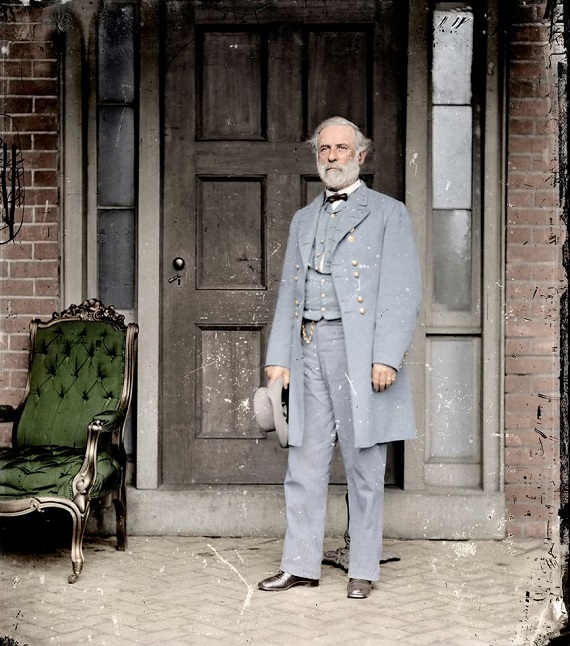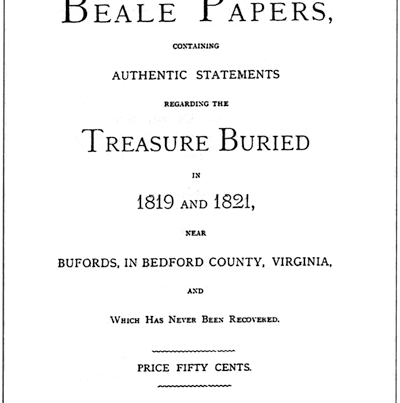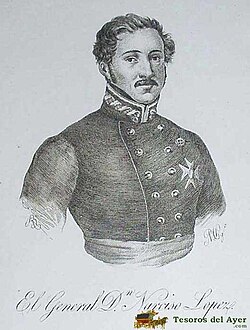
Over a century and a half has passed since Confederate States General Robert E. Lee surrendered the Army of Northern Virginia to General Ulysses S. Grant. Yet, despite surrender by one and victory by the other, controversy continues regarding which man better represents the virtues of honor, duty, and American patriotism. For those who believe that might makes right, then the answer is clear—trial by combat has pronounced General Grant as America’s icon of patriotism, valor and honor. But from the South there lingers the refrain penned by Father Ryan, the Poet Priest of the Confederacy, “The triumphs of might are transient—they pass and are forgotten—the sufferings of right are graven deepest on the chronicle of nations.” There exists an antagonistic gulf between the estimations of two different peoples as they take measure of the men who championed their nation’s cause. In reality Lee and Grant cannot be compared but only contrasted.
Grant the Champion of One Nation Indivisible
If Grant had any political philosophy at all it was that of an American nationalist. His nationalist fever arose from his military training at West Point and his military experience in the Mexican-American War (1846-48). Grant ranked number 21 out of 39 in the class of 1843.[1] Although never known as a deep thinker in political or theological matters, he followed the nationalist views of Alexander Hamilton, Henry Clay, Daniel Webster, and Abraham Lincoln. All of these American nationalists stressed the supremacy of the national (federal) government. Alexander Hamilton (1757-1804), is the father of American nationalism. Hamilton:
…wanted to use the (federal government’s) centralized power to subsidize business in particular,…so as to make them supportive of an ever-growing state…(He) believed that the new American government should pursue the course of national and imperial glory, just like the British, French, and Spanish empires.”[2]
Grant’s radical nationalism is demonstrated by the fact that he wanted to expel the French from Mexico. After Appomattox he sent 50,000 troops to the Texas-Mexican border and provided 30,000 rifles to Mexican guerrillas.[3] No doubt he hoped to establish a puppet government in Mexico that would be subservient to the U.S. federal government, as was eventually done in the conquered Confederate States.[4]
Nationalists owe their primary allegiance to the national government and said allegiance is seldom constrained by traditional Christian morality. Grant’s apologists attempt to obscure Grant’s moral failings by draping him in the robes of one “fighting to end slavery.” But Grant’s wife held personal slaves at the beginning of the war. These slaves were not freed by Lincoln’s Emancipation Proclamation. Lincoln’s Proclamation applied to slaves in territories controlled by the Confederate States while exempting slaves in territories controlled by the United States. Mrs. Grant’s slaves were freed well after the War by the passage of the Thirteenth Amendment. According to one account, Grant’s excuse for not freeing his wife’s slaves was that “good help is so hard to come by these days.”[5]
During the War, General Grant followed the United States’ war policy of attempting to inflict starvation on Southern civilians—an act of war that was a violation of international moral standards for civilized warfare. One of Grant’s orders was, “In pushing up the Shenandoah Valley…it is desirable that nothing should be left to invite the enemy to return…such as cannot be consumed destroy…”[6] In 1863, Grant wrote:
Rebellion has assumed that shape now that it can only terminate by the complete subjugation of the South…It is our duty to weaken the enemy, by destroying their means of subsistence, withdrawing their means of cultivating their fields, and in every other way possible.”[7]
So successful were the invader’s efforts to induce civilian starvation that by 1865 over 500,000 Southerners were without the necessities of life and many died of starvation—and this number accounts for starvation in only four of the Southern states.[8]
Implicit in the Northern claim that Grant was fighting to free slaves is the claim that such men would naturally be free of racial bias. It is treated as heresy to question the racial motives of men who were “fighting to free the slaves.” But Grant’s life leaves little to recommend him to modern day social justice warriors. Grant was an outspoken anti-Semite. In 1862 Grant issued his infamous General Order 11 that expelled all Jews from his area of command.[9] But Jews were not his only targets of racial hatred. As president, Grant would place his and his political cronies’ interests in Black Hills (Montana) gold above the legitimate treaty rights of American Indians. In a message to Congress he declared, “…I see no substitute…except in placing all the Indians on large reservations.” A treaty with the Indians signed in 1868 gave the Lakota Sioux exclusive control of the Black Hills but President Grant saw the exploitation of Black Hills’ gold as a way to lift the 1874 national (Northern) economy.[10] Grant’s solution was to provoke a war with the Indians and thereafter declare the treaty to be void and occupy the Black Hills as spoils of war.[11] Grant’s plan to incite a war with the Indians was similar to the way in which Lincoln provoked the South to “fire the first shot” at Fort Sumter.[12] At least subsequent generations of American Indians got some form of justice when in 1975 a federal court judge noted that “President Grant’s duplicity…A more ripe and rank case of dishonorable dealing will never, in all probability, be found in our history.”[13]
Grant’s apologists are quick to claim that Grant was an advocate of black civil rights. Yet while Grant favored allowing newly freed slaves down South to vote, he did nothing for civil rights for blacks up North or civil rights for Chinese in California. Efforts to allow Northern blacks to vote had been rejected on numerous occasions in most of the Northern states and the very few that did allow blacks to vote had an almost non-existent black population, i.e., graciously allowing blacks to vote would have little if any impact on the mostly white election returns in Northern states. The point being that white Republican rule in the North and West would be secure.
Grant became very interested in black Southern votes after the 1870-1 off-year election in which his Republican party lost numerous House and Senate seats. Grant became interested in black Southern votes only when it became evident that black Southern votes would be the only way to keep Congress under Republican control. During Reconstruction the Republican Party and Grant’s Administration skillfully used the technique of “divide and rule” to maintain Republican political dominance over the South and thereby assure Republican control of Congress.[14]
Perhaps the most damning evidence of Grant’s dismissive attitude toward blacks was his dismissal of his Attorney General, Amos Akerman. Akerman, a Southerner, was very active in suppressing white Southern efforts to remove Northern controlled puppet state governments and regain control of their state governments. These “efforts” often took on similar violent characteristics as the violence and threats of violence used by the federal government sponsored, pro-Republican, Union League.[15] Akerman was also seeking to punish individuals close to the President who were involved in the numerous scandals associated with Grant’s Administration. Columbus Delano, Grant’s Secretary of the Interior, complained about Akerman to Grant. President Grant, in an effort to protect his friends, demanded Akerman’s resignation. Grant replaced Akerman with George Williams who was later forced to resign due to accusations of bribery.[16]
Grant was keen to take advantage of his position as President to increase his personal fortunes. The numerous scandals during his administration would not be matched until the arrival of globalism, Wall Street crony capitalism, and the Washington, DC Deep State. It was during Grant’s Administration that the term “lobbyist” became a common expression. It was said the Grant used the lobby of the Willard Hotel to sit and smoke cigars. Well-connected power brokers would meet Grant in the lobby seeking favors—thus the term lobbyist—although the term was used as early as 1842 to describe efforts of Whigs to persuade Congress to secure protection for their pet business schemes.[17]
Grant was a man of modest financial means, whose personal ambitions were not guided by any real political or theological philosophy. He lived a life filled with the death of thousands of the men under his command, and his enemies, both military and civilian, in the South. His political career was one filled with scandal. At the time of his death he was penniless and in debt. His wife, though, did reap a fortune from the sale of his memoirs which were published shortly after his death.
Lee the Champion of the Republic of Sovereign States
Robert E. Lee was the son of the Revolutionary War hero Light Horse Henry Lee. Although born into Virginia’s plantation society, Lee’s life was not one of ease and leisure. His father’s poor financial activities left the family in a less than admirable financial condition. Lee was part of Virginia’s high society but his meager finances meant he would have to earn his own living.[18] An appointment by Senator John C. Calhoun of South Carolina to West Point provided Lee an opportunity to make his mark in the world. In 1829 Lee graduated second in a class of 46.[19] Lee received no demerits during his four years at West Point. As a young man he demonstrated that he was a man who held himself to high standards.
During the War, unlike the invader’s army, Lee demanded that his men refrain from pillaging when the Confederate Army invaded the North during the Gettysburg campaign. In an order issued to his troops Lee reminded them that:
It must be remembered that we make war only upon armed men, and that we cannot take vengeance for the wrongs our people have suffered without lowering ourselves in the eyes of all whose abhorrence has been excited by the atrocities of our enemies, and offending Him to whom vengeance belongeth…[20]
Notice how Lee identifies his fellow Southerners as “our people” and he instructs his troops not to fall prey to the desire to seek vengeance against innocent Northern civilians even though Northern armies were currently committing “atrocities” against innocent Southern civilians. Notice also that Lee instructs his troops to be careful not to make war in a manner that would offend God.
Lee held strong political and theological beliefs. He was a practicing Christian. His moral standards were firmly based in the Holy Bible. Lee readily acknowledged his Christian faith:
I can only say that I am nothing but a poor sinner, trusting in Christ alone for salvation.[21]
Lee’s political views were a natural part of Virginia society. While he loved the United States, it was a love that was conditioned upon a mutuality of respect among the States as required by the Constitution. Lee’s refusal to make war against his native state when offered a command position in the Union Army in 1861 is in line with the attitude of another Virginian of an earlier era. Patrick Henry declared in 1787, “The first thing I have at heart is American liberty, second thing is American Union.”[22] For Lee, just like Patrick Henry, liberty always trumps government. This principle was taught at West Point—although not every cadet took it to heart. The first textbook on the Constitution used at West Point taught that States had the right to secede from the Union.[23] Many future Confederate officers were taught at West Point that the Union was based upon mutual respect and benefits. If that mutuality of respect and benefits was abandoned, then the Sovereign State was no longer bound to the Union.[24] This is why Virginia, and other Sovereign States, reserved the right to withdraw their consent to the new Union when they ratified the Constitution in 1787-8. It is also the reason they insisted upon the Ninth and Tenth Amendments to the new Constitution. Lee understood this Constitutional principle and he was proud to lead his people in the defense of the right of a free people to live under a government based upon the free and unfettered consent of the governed—an American principle proclaimed in the Declaration of Independence.
Slavery is routinely used by leftwing Northern apologists when attempting to minimize Lee’s high moral and ethical character. They find this necessary because Lee’s high standards are in such sharp contrast with the low standards of Northern men such as Grant, Sherman, and Butler. Leftwing Northern apologists, while writing about Lee, will often admit his high standards but then attempt to debunk Lee by declaring, “How well the Southern mythmakers have done their job. It is so easy to forget the reality of slavery, and see the war through the eyes of sentimental storytellers…”[25] A well-known “History” website ended its reasonably fair evaluation of General Lee with the following false and slanderous nationalist disclaimer:
While Lee did not support secession, he never defended the rights of slaves. Instead, he led the Confederates as they attempted to dissolve the United States that his own father helped create.[26]
Leftwing Northern apologists use slavery to distort historical and constitutional reality. They conveniently overlook the fact that slavery was legal in all thirteen American Colonies when they seceded from their union with the British Empire.[27] How easy it is for leftwing Northern apologists to forget that slavery existed 72 years longer in the Northern state of Massachusetts than it did in the Southern state of Mississippi or that the financial capital that built New England’s industrial empire was obtained by New England states that were actively engaged in the nefarious international slave trade. How easy it is for leftwing Northern apologists to ignore the fact that until Northern radical abolitionists turned slavery into a political issue, there were more abolition societies in the South than the North and legislatures in states such a Virginia were holding sincere discussions about abolishing slavery. [28]
Lee’s attitude about slavery was summed up in a letter he wrote shortly before the War. In his letter Lee declared, “In this enlightened age, there are few I believe, but what will not acknowledge, that slavery as an institution, is a moral and political evil in any country.”[29] Lee’s attitude toward black Southerners is best demonstrated by an incident that took place in Richmond shortly after the War:
In St. Paul’s Church in Richmond, Virginia, June, 1865, …When the priest offered a call to Holy Communion, a tall, well-dressed black man approached the communion table first ahead of the white congregation, causing shock. For an awkward moment the congregation did not move. Then Lee rose, walked to the communion rail and knelt near the black man…this had a magic effect upon the other communicants…who went forward to the communion table.[30]
In a time of political and social uncertainty and fear, Lee reacted as one would expect a Christian to react. No wonder the leftwing Northern apologists constantly attempt to smear the character of General Robert E. Lee. But Lee’s character has inspired favorable commentary from national and international leaders.
Winston Churchill wrote that General Lee was, “…one of the noblest Americans who ever lived, and one of the greatest captains in the history of war.” World War II British hero General Montgomery described Lee as “possibly the best American military thinker and organizer of those days…”[31]
Union General Winfield Scott once declared that Lee was “the very best soldier that I ever saw in the field.”[32] President John F. Kennedy boldly declared of the South and Lee:
As a New Englander, I recognize that the South is still the land of Washington, who made our Nation, of Jefferson, who shaped its direction, and of Robert E. Lee who, after gallant failure, urged those who had followed him in bravery to reunite America in purpose and courage.[33]
When President Eisenhower was questioned why the President of the United States would have a photograph of General Robert E. Lee in his presidential office, President Eisenhower wrote back:
General Robert E. Lee was, in my estimation, one of the supremely gifted men produced by our Nation. He believed unswervingly in the Constitutional validity of his cause …Through all his many trials, he remained selfless almost to a fault and unfailing in his faith in God … he was noble as a leader and … unsullied as I read the pages of our history … a nation of men of Lee’s caliber would be unconquerable in spirit and soul … Such are the reasons that I proudly displaythe picture of this great American on my office wall.[34]
When men of such high social standing are willing to make public their respect for General Lee, it calls to question the character of those leftwing Northern apologists who attempt to smear General Lee. One can only wonder if perhaps their dedication to their leftist ideology is the real motive for attempting to convince the world that Lee’s ideas are not worthy of consideration. Why would leftist fear Lee’s ideas about government?
In August of 1870 General Lee, after viewing the results of the North’s victory, in a private meeting he told the former Confederate Governor of Texas:
Governor, if I had foreseen the use those people designed to make of their victory, there would have been no surrender at Appomattox Courthouse; no, sir, not by me. Had I foreseen these results of subjugation, I would have preferred to die at Appomattox with my brave men, my sword in this right hand.[35]
These words of indictment against the victorious Northern political regime are similar to his thought expressed in a December, 1866, letter to Lord Acton:
I consider it (States’ Rights) as the chief source of stability to our political system, whereas the consolidation of the states into one vast republic, sure to be aggressive abroad and despotic at home.[36]
Such words are dangerous, especially to those who benefit from the “consolidated” supreme federal government and its, Deep State, ruling elites. Perhaps this is the real reason why American nationalists are so eager to slander General Robert E. Lee.
General Robert E. Lee stands in sharp contrast not only to General Grant but to all of the left-of-center, politically correct, sycophants of America’s globalist, supreme federal government and its Deep State. The supreme federal government that rules America today has become the government of Lee’s prediction—an unconstitutional supreme federal government that is, “despotic at home.”
[1] https://civilwarintheeast.com/west-point-officers-in-the-civil-war/class-of-1843/ accessed 4/11/2020.
[2] DiLorenzo, Thomas J., Hamilton’s Curse (Crown Publishing Group, New York: 2008), 2.
[3] Leigh, Philip, U.S. Grant’s Failed Presidency (Shotwell Publishing Co., Columbia, SC: 2019), 12.
[4] Kennedy & Kennedy, Yankee Empire: Aggressive Abroad and Despotic at Home (Shotwell Publishing Co., Columbia, SC: 2018), 122-4.
[5] Kennedy & Kennedy, The South Was Right! (Pelican Publishing Co., Gretna, LA: 1994), 27; citing The Gray Book.
[6] Kennedy & Kennedy, The South Was Right!, 283.
[7] Kennedy & Kennedy, The South Was Right!, 288.
[8] Fleming, Walter Lynwood, The Sequel of Appomattox (Glasgow, Brooks & Co., New York: 1970), 14.
[9] https://www.history.com/news/ulysses-grant-expulsion-jews-civil-war accessed 4/10/2020.
[10] The former Confederate States of the South were at that time suffering under the Northern imposed “punishment of poverty.” As explained in Kennedy & Kennedy, Punished With Poverty-the Suffering South (Shotwell Publishing Co., Columbia, SC: 2017).
[11] Leigh,146-7.
[12] Kennedy & Kennedy, Yankee Empire: Aggressive Abroad and Despotic at Home, 118-22.
[13] As cited in, Leigh, 150.
[14] Kennedy & Kennedy, Yankee Empire: Aggressive Abroad and Despotic at Home, 115.
[15] Chodes, John, Washington’s KKK: The Union League During Southern Reconstruction (Shotwell Publishing Co., Columbia, SC: 2016), xi, 35, 39, & 40.
[16] Leigh, 97-9.
[17] https://www.merriam-webster.com/words-at-play/the-origins-of-lobbyist accessed 4/10/2020.
[18] Earle, Peter, Robert E. Lee (Saturday Review Press, New York: 1973), 22.
[19] https://civilwarintheeast.com/west-point-officers-in-the-civil-war/class-of-1829/ accessed 4/11/2020.
[20] Lee as cited in, Earle, 154.
[21] https://www.es.quotemaster.org/qe2e333bea60a237db6e6353efd16730d accessed 4/13/2020.
[22] Patrick Henry as cited in, Kennedy & Kennedy, Yankee Empire: Aggressive Abroad and Despotic at Home, 201.
[23] Rawle, William, A View on the Constitution (1825, Land & Land Publishing, Baton Rouge, LA: 1993), 235, 238-9.
[24] Kent, James, Commentaries on American Law (1826, Da Capo Press, New York: 1971) Vol. I, 195-6; also used at West Point prior to 1861.
[25] Earle, 12.
[26] https://www.history.com/topics/american-civil-war/robert-e-lee accessed 4/11/2020. A book could be written exposing the three major falsehoods asserted in this one short but slanderous statement made in an effort to justify the destruction of the original Republic of Sovereign States and the creation of a supreme federal government.
[27] In May 1776 Virginia declared that “the union…between Great Britain and the American colonies is totally dissolved,” as cited in Kennedy & Kennedy, Was Jefferson Davis Right?, (Pelican Publishing Co., Gretna, LA: 1998), 258.
[28] Simkins, Francis Butler, A History of the South (Alfred A. Knopf, NY: 1959), 117.
[29] Lee as cited by, Livingston, Donald W., Confederate Emancipation Without War, To Live and Die In Dixie, Frank Powell, ed., (Sons of Confederate Veterans, Columbia, TN: 2014), 467.
[30] Livingston, Donald W., Confederate Emancipation Without War, To Live and Die In Dixie, 482.
[31] Churchill and Montgomery as cited in, Earle, 8.
[32] https://www.history.com/topics/american-civil-war/robert-e-lee accessed 4/11/2020.
[33] President Kennedy speaking in NC, https://www.presidency.ucsb.edu/documents/speech-senator-john-f-kennedy-raleigh-nc-coliseum accessed 3/20/2020.
[34] https://www.civilwarprofiles.com/dwight-d-eisenhower-in-defense-of-robert-e-lee/ accessed 4/12/2020.
[35] Lee speaking to Governor Stockdale as cited in, Kennedy & Kennedy, The South Was Right!, 41-2.
[36] Lee as cited in, Kennedy & Kennedy, Yankee Empire: Aggressive Abroad and Despotic at Home, 65.







Well researched load of crap. This article could be printed on a white sheet and used to wipe Lee’s ass. Grant was and always will be the better man, you wannabe slave owning POS’s.
Fantastic article and well researched and written. I have studied history all my life..and this article is spot on. I’m teaching the next generation the truth about the Civil War, slavery was not the issue (as terrible as it was,) it was about the constitution and state’s rights.
The Grant quote is unsourced and fake. It took me 30 seconds to ascertain that. You have no excuse whatsoever, neanderthal scum.